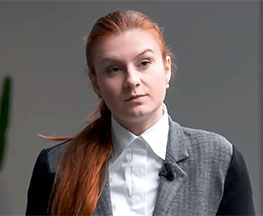WASHINGTON, (Reuters) – Accused Russian agent Maria Butina, suspected of trying to infiltrate the National Rifle Association and influence U.S. policy toward Russia, is expected to plead guilty this week following a deal between her lawyers and U.S. prosecutors, according to court filings yesterday.
Exactly how the deal will be structured for Butina was not immediately clear. U.S. District Judge Tanya Chutkan in Washington scheduled a hearing for tomorrow.
CNN reported on Monday that Butina had already begun to cooperate with prosecutors, citing one source familiar with the matter. A representative for the U.S. Attorney’s Office declined to comment on the case.
ABC News first reported that Butina would cooperate with prosecutors.
Butina, a former American University graduate student, had previously pleaded not guilty to U.S. charges in July that she was acting as an agent of the Russian government and conspiring to take actions on Russia’s behalf.
Prosecutors have accused her of working with a Russian official and two U.S. citizens to try to infiltrate the powerful NRA lobby group that has close ties to Republican politicians including President Donald Trump, and influence Washington’s policy toward Moscow.
Butina’s lawyers previously identified the Russian official as Alexander Torshin, a deputy governor of Russia’s central bank who was hit with U.S. Treasury Department sanctions in April.
One of the two Americans mentioned in the prosecutors’ criminal complaint was Paul Erickson, a conservative U.S. political activist who was dating Butina. Neither Erickson nor Torshin has been accused by prosecutors of wrongdoing.
Butina’s cooperation will mainly focus on telling investigators about the role of Erickson and her interactions with Russian officials, CNN reported.
The case against Butina is being prosecuted by the U.S. Attorney’s Office in Washington and the National Security Division, and not U.S. Special Counsel Robert Mueller, who is investigating Russian interference in the 2016 U.S. election and any coordination between Moscow and Trump campaign members.
The government’s complaint against Butina did not explicitly mention Trump’s campaign. Trump has denied any collusion with Moscow occurred.
Reuters previously reported, however, that Butina was a Trump supporter who bragged at parties in Washington that she could use her political connections to help get people jobs in the Trump administration.
In a Dec. 8, 2016, class project at American University, she gave a presentation titled “What Might President Trump’s Foreign Policy Be Toward Russia?” and listed several of Russia’s policy objectives, according to a copy reviewed by Reuters.
Whether she could help shed any light on contacts between Trump’s campaign and Russia is not known.
Moreover, the prosecutors in her case have previously made mistakes, including erroneously accusing Butina of offering sex in exchange for a position in a special interest group. The errors could possibly have helped give Butina more leverage in reaching a plea deal.

